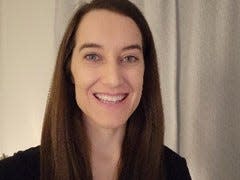Opinion: Students with disabilities shouldn’t be afterthought at Buncombe County schools
This spring, I have been anxiously shuffling from school tour to school tour trying to determine which school will best meet my child’s educational needs.
On a recent tour of a public charter school in Buncombe County, I listened as the school representative explained the importance of outdoor play for all children as we walked by the playground. All of us parents nodded in agreement. I then pointed to the staircase leading up to the playground and asked, “Is that the only entrance?” Appearing caught off guard, the tour guide replied, “Yes.”
I explained to her that my son is a wheelchair user and asked how he would enter the playground since I didn’t see a ramp. “We’d have to figure something out,” she said, then resumed the tour.
This was not the first time I encountered an inaccessible space for people with disabilities at a taxpayer-funded school.
A few weeks earlier at a different public charter school, I was being led up several flights of stairs to a school building when I asked if there was a wheelchair-accessible entrance. While the response was more generous, “We could see about putting in a ramp,” all I could think was: why haven’t you?
It's been more than 33 years since the Americans with Disabilities Act was passed, a monumental civil rights law that prohibits discrimination based on disability. Both schools I visited were founded after the ADA became law and yet these two schools were designed in a way that deny access to many students with disabilities. Whether the inaccessible design was intentional or not, the leadership at these schools has failed for many years to remedy those barriers.
Unfortunately, these schools are not unique, and it’s not just charter schools failing to provide access to students like my son. In 2020, a Government Accountability Office report found the majority of public school districts in the United States are not accessible for students with disabilities.
According to Pew Research Center, students with disabilities made up 15% of national public school enrollment during the 2021-2022 school year. Their right to a free public education and special education services is protected by the federal Individuals with Disabilities Education Act (IDEA).
Despite laws in place to protect disabled students, like my son, public schools fail to meet some of the most basic accessibility requirements. For students who are wheelchair users that means making school playgrounds and buildings wheelchair accessible. After all, ramps provide access for disabled and non-disabled students.
Toward the end of the school tours, I asked both representatives how many of their students are wheelchair users and both responded “None.” I wasn’t surprised by their response.
When a disabled child and their caregivers encounter an inaccessible school playground or school building, the message is clear — you don’t belong here. Even if the representatives were serious about finding a solution, I don’t want my child to feel like he is an afterthought, or worse, a problem to be solved.
A common and harmful misconception in our society is there isn’t a need to invest in accessibility because “disabled people don’t come to our events,” or “disabled people don’t want to attend our school,” or “(fill in the blank)”. The reality is that people with disabilities want to enjoy their community as much as non-disabled people, but they aren’t going to attend an event, apply for a school or job, or visit a park if it’s inaccessible to them.
Disability rights activist Rebecca Cokley said in a video interview on the topic of disability inclusion: “This is not a call out. This is a call in.”
In that spirit, I urge public school leaders everywhere to conduct accessibility audits on your campuses, include accessibility information on your websites and recruit people with disabilities to join your staff, PTAs and school improvement teams. If you’re a parent of non-disabled school age children and you value diversity, equity and inclusion, I urge you to start having conversations with your school’s leadership, teachers and other parents about accessibility. Having these conversations can help raise awareness and lead to action. Let’s not let another year go by when disabled students, like my son, feel they don’t belong in school.

Beth Connor is a professional fundraiser for a national affordable housing organization that develops, owns and operates affordable homes for families, older adults, veterans and people with disabilities.
This article originally appeared on Asheville Citizen Times: Opinion: Buncombe schools need better access to wheelchair users
